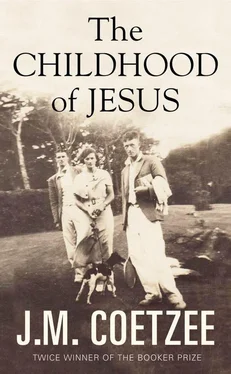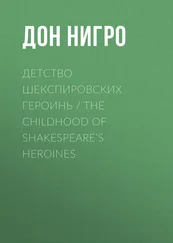Inés shrugs. ‘I always knew he would let me down. He must be the most self-centred person in the world.’
It is the first time she has criticized either of her brothers in his hearing, the first time she has sided with him.
‘One grows very self-centred, living in La Residencia,’ she goes on.
He waits for more — about La Residencia, about her brothers — but she has said enough.
‘I have never dared ask,’ he says: ‘Why did you accept the boy? The day we met, you seemed to take such a dislike to us.’
‘It was too sudden, too much of a surprise. You came out of nowhere.’
‘All great gifts come out of nowhere. You should know that.’
Is it true? Do great gifts really come out of nowhere? What possessed him to say that?
‘Do you really think,’ says Inés (and he cannot but hear the feeling behind her words), ‘do you really think I had not longed for a child of my own? What do you think it was like, being shut up in La Residencia all the time?’
He can now give the feeling a name: bitterness.
‘I have no idea what it was like. I have never understood La Residencia or how you landed up there.’
She does not hear the question, or does not think it worthy of reply.
‘Inés,’ he says, ‘let me ask for the last time: Are you sure this is what you want to do — run away from the life you know — and all because the child doesn’t get on with his teacher?’
She is silent.
‘This is not a life for you, a life of flight,’ he presses on. ‘Nor does it suit me. As for the boy, he can be a runaway only so long. Sooner or later, as he grows up, he is going to have to make his peace with society.’
Her lips tighten. She stares furiously ahead into the darkness.
‘Think about it,’ he concludes. ‘Think hard. But whatever you decide, be assured, I will’ — he pauses, resisting the words that want to come out — ‘I will follow you to the ends of the earth.’
‘I don’t want him to end up like my brothers,’ says Inés, speaking so softly that he has to strain to hear her. ‘I don’t want him to become a clerk or a schoolteacher like that señor León. I want him to make something of his life.’
‘I am sure he will. He is an exceptional child, with an exceptional future. We both know it.’
The headlights pick out a painted sign at the roadside. Cabañas 5 km . Soon afterwards there is another sign: Cabañas 1 km .
The cabañas in question are set off from the road, in total darkness. They find the office; he gets out and raps on the door. It is opened by a woman in a dressing gown holding a lantern. For the past three days the electricity has been cut off, she informs them. No electricity, therefore no cabañas for hire.
Inés speaks. ‘We have a child in the car. We are exhausted. We can’t go on driving all night. Don’t you have candles we can use?’
He returns to the car, shakes the child. ‘Time to wake up, my precious.’
In a single fluid moment the dog rises and slips out of the car, the heavy shoulders brushing him aside like a straw.
The boy rubs his eyes sleepily. ‘Are we there?’
‘No, not yet. We are going to stop for the night.’
By the light of her lantern the woman shows them over the nearest of the cabañas . It is skimpily furnished but it has two beds. ‘We will take it,’ says Inés. ‘Is there anywhere we can get a meal?’
‘The cabañas are self-catering,’ the woman replies. ‘You have a gas cooker over there.’ She waves the lantern in the direction of the cooker. ‘Have you brought no supplies?’
‘We have a loaf of bread, and some fruit juice for the child,’ says Inés. ‘We didn’t have time to shop. Can we buy food from you? Perhaps some chops or sausages. Not fish. The child doesn’t eat fish. And some fruit. And whatever scraps you have for the dog.’
‘Fruit!’ says the woman. ‘It’s a long time since we last saw fruit. But come, let us see what we can find.’
The two women depart, leaving them in darkness.
‘I do eat fish,’ says the boy, ‘only not if it has eyes.’
Inés returns with a can of beans, a can of what the label calls cocktail sausages in brine, and a lemon, as well as a candle and matches.
‘What about Bolívar?’ asks the boy.
‘Bolívar will have to eat bread.’
‘He can eat my sausages,’ says the boy. ‘I hate sausages.’
They eat a frugal meal by candlelight, sitting side by side on the bed.
‘Brush your teeth, then it is bedtime,’ says Inés.
‘I’m not tired,’ says the boy. ‘Can we play a game? Can we play Truth or Consequences?’
It is his turn to baulk. ‘Thank you, David, but I have had enough consequences for one day. I need to rest.’
‘Then can I open señor Daga’s present?’
‘What present?’
‘Señor Daga gave me a present. He said I must open it in time of need. It’s time of need now.’
‘Señor Daga gave him a present to take along,’ says Inés, avoiding his eyes.
‘It’s time of need, so can I open it?’
‘This is not the real time of need, the real time of need is yet to come,’ he says, ‘but yes, open it.’
The boy runs out to the car and returns bearing a cardboard box, which he tears open. It contains a black satin gown. He lifts this out and unfolds it. Not a gown but a cape.
‘There is a note,’ says Inés. ‘Read it.’
The boy brings the paper closer to the candle and reads: Behold the magic cloak of invisibility. Whoever wears it shall walk the world unseen. ‘I told you!’ he cries, dancing with excitement. ‘I told you señor Daga knows magic!’ He wraps the cape around himself. It is much too large. ‘Can you see me, Simón? Am I invisible?’
‘Not quite. Not yet. You didn’t read the whole note. Listen. Instructions to the wearer. To attain invisibility, wearer shall don the cloak before a mirror, then set fire to the magic powder and utter the secret spell. Whereupon the earthly body shall vanish into the mirror leaving only the traceless spirit behind. ’
He turns to Inés. ‘What do you think, Inés? Shall we let our young friend don the cloak of invisibility and utter the secret spell? What if he vanishes into the mirror and never returns?’
‘You can wear the cloak tomorrow,’ says Inés. ‘It is too late now.’
‘No!’ says the boy. ‘I am going to wear it now! Where is the magic powder?’ He rummages in the box, comes up with a glass jar. ‘Is this the magic powder, Simón?’
He opens the jar and smells the silvery powder. It has no smell.
There is a full-length mirror, spotted with fly droppings, on the wall of the cabaña . He sets the boy before the mirror, buttons the cape at his throat. It descends in heavy folds around his feet. ‘Here: hold the candle in one hand. Hold the magic powder in the other. Are you ready with the magic spell?’
The boy nods.
‘Very well. Sprinkle the powder over the candle flame and utter the spell.’
‘Abracadabra,’ says the boy, and sprinkles the powder. It falls to the floor in a brief rain. ‘Am I invisible yet?’
‘Not yet. Try more of the powder.’
The boy dips the candle flame into the jar. There is a huge eruption of light, then utter darkness. Inés utters a cry; he himself recoils, blinded. The dog begins barking like a thing possessed.
‘Can you see me?’ comes the boy’s voice, tiny, unsure. ‘Am I invisible?’
Neither of them speaks.
‘I can’t see,’ says the boy. ‘Save me, Simón.’
He gropes his way to the boy, raises him from the floor, kicks the cloak aside.
‘I can’t see,’ says the boy. ‘My hand hurts. Am I dead?’
Читать дальше












